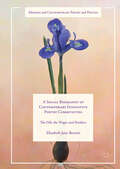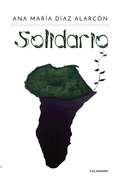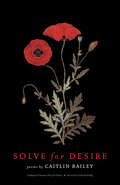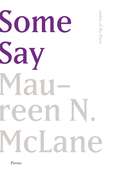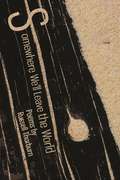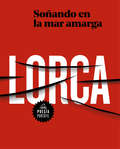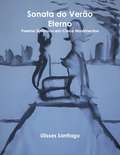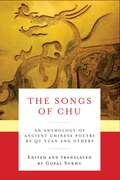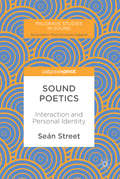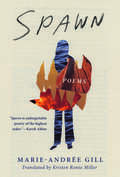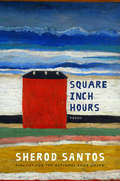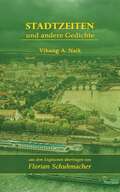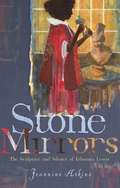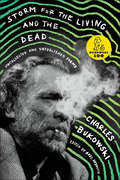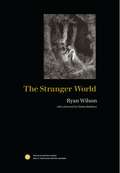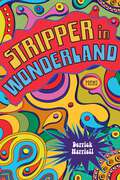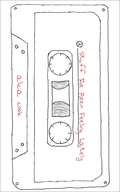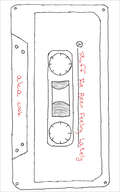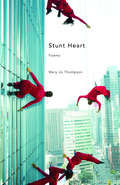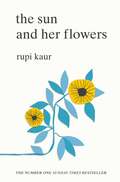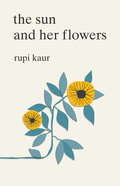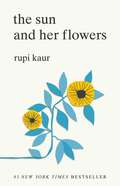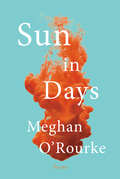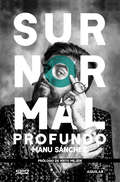- Table View
- List View
A Social Biography of Contemporary Innovative Poetry Communities: The Gift, the Wager, and Poethics (Modern and Contemporary Poetry and Poetics)
by Elizabeth-Jane BurnettThis book offers a new reading of Marcell Mauss' and Lewis Hyde's theories of poetry as gift, exploring poetry exchanges within 20th and 21st century communities of poets, publishers, audiences and readers operating along a gift economy. The text considers trans-Atlantic case studies across fields of performance and ecopoetics, small press publishing and poetry institutions, with focus on Joan Retallack, Bob Holman, Anne Waldman, Bob Cobbing, and feminist performance. Elizabeth-Jane Burnett focuses on innovative poetry that resists commodification, drawing on ethnography to show parallels with gift giving tribal societies; she also considers the ethical, philosophical and psychological motivations for such exchanges with particular reference to poethics. This book will appeal to researchers in modern poetry, poetry teachers, advanced students of modern literature, and those with an interest in poetry.
Solidario
by Ana María Díaz AlarcónLa Poesía, amiga de la soledad y mía, confidente de mis días. Leemos sonoridades, evocaciones, deseos. <P><P>Nos asomamos a estos poemas, como una ventana, desde donde ojear los amaneceres, los colores, el mar, el amor, el deseo, la vida bulliciosa y muy preciada, la solidaridad, la Paz, la educación y la cultura; los niños con sus asombrados ojos. Recogemos nuestros sentimientos desde el paisaje mediterráneo. <P><P>Ciudad donde el fresquísimo aire de verano es un gran abanico por la noche. El tiempo, siempre escaso en una vida. En sus páginas, las palabras son escasas para nombrar; se asemejan a una música y una vitalidad; descripciones en unos momentos gratificantes. Hay veces donde las ilustraciones, hacen la lectura más llevadera, o simplemente menos monótona. <P><P>Vaya este libro para mi incansable hija, Ana; mis amigos desde la infancia, hasta los años muy venideros, mis conocidos, en los distintos espacios donde transcurre mi vida.
Solve for Desire: Poems
by Caitlin BaileyA debut poetry collection exploring the real lives of siblings Georg and Grete Trakl while addressing themes of desire, addiction, loss, and absence. Georg Trakl is one of the most celebrated poets of the early twentieth century. Less is known about his sister, Grete: also gifted, also addicted to drugs, and dead by her own hand three years after Georg&’s overdose. But in Solve for Desire—selected by Srikanth Reddy as the winner of the 2017 Lindquist & Vennum Prize for Poetry—Caitlin Bailey summons Grete from the shadows. At once sensual and acidic, obsessive and bereft, the Grete of these poems is a fairy-tale sister leaving &“missives dropped around the city, crumbs / for your ghost.&” Can one person be addicted to another? Can two souls be twinned, and where does that leave the physical? How do we solve for desire when the object we adore disappears—and how does the poet solve and resolve the past, its wounds and its absences? &“Each time I write your name,&” Bailey writes, &“a key / turns somewhere in a lock.&” Like the &“perfect red burst&” of poppies and of blood, these poems are a blooming, keening exploration of desire between brother and sister, poet and subject, the living and the dead.Praise for Solve for Desire &“The work of a poet who sings, boldly, across the distances between us.&” —Srikanth Reddy &“A sobering look at desire, addiction, loss, and absence in this debut collection of short, lyric poems that are by turns lush and understated, lofty and plainspoken. . . . She performs a kind of feminist resuscitation of the lesser-known Grete, focusing on small moments of quiet, grief, lust, and memory, and fleshing out a story that is still disputed&” —Publishers Weekly &“This precarious, satisfyingly disjointed debut collection of poetry captures the spirit of the [Trakl] siblings. . . . Bailey&’s brilliantine lyrics shine brightest when the siblings&’ characters are wrought in full relief.&” —Booklist
Some Say: Poems
by Maureen N. MclaneA dazzling collection of poems exploring the mental landscape of our momentMaureen N. McLane’s Some Say revolves around a dazzling “old sun.” Here are poems on sex and death; here are poems testing the “bankrupt idea / of nature.” Some Say offers an erotics of attention; a mind roaming, registering, and intermittently blocked; a mortal poet going “nowhere fast but where / we’re all going.” From smartphones to dead gods to the beloved’s body, Some Say charts “the weather of an old day / suckerpunched” into the now. Following on her bravura Mz N: the serial: A Poem-in-Episodes, McLane bends lyric to the torque of our moment—and of any moment under the given sun. Some Say encompasses full-barreled odes and austere lines, whiplashing discourse and minimal notations. In her fifth book of poems, McLane continues her “songs of a season” even as she responds to new vibrations—political, geological, transpersonal, trans-specific. Moving through forests and cities, up mountains, across oceans, toward a common interior, she sounds out the ecological mesh of the animate and inanimate. These are poems that make tracks in our “unmarked dark” as the poet explores “a cosmos full / of people and black holes.” From its troubled, exhilarated dawns to its scanned night sky, Some Say is both a furthering and a summation by a poet scouring and singing the world “full // as it always was / of wings / of meaning and nothing.”
Somewhere We'll Leave the World
by Russell ThorburnThe poems in Russell Thorburn’s Somewhere We’ll Leave the World are fluid and masterful with a flow that captures an authentic consciousness. These poems breathe and allow the reader breathing room. Powerful images and deft endings arrive like the best kind of emotional left hook—the kind that leaves you wanting more. This book is for long-walkers and dreamers who don’t mind the cold or heat or the miles ahead. The reader is taken on a journey through snowy woods, stopping to confront a wolf or meet with Jim Harrison. Divided into four sections, Somewhere We’ll Leave the World draws on the poet’s own experiences while imagining chance encounters with fictional characters and personal heroes. Before long, it is obvious to the reader that every moment is up for grabs—a late night viewing of Hell Is for Heroes, a drive down Woodward Avenue in a friend’s Volkswagen, a hike through the Mojave National Preserve. Through the book’s filmic scenes, imagine Wim Wenders behind the camera as the poet re-creates the scenes of his own life. In good company with the likes of Charles Bukowski and James Wright, Thorburn tips his hat to those who have come before him, while blazing his own winding and fantastical trail. This thoroughly unique poetry collection gives us an honest and lyrical assessment of national wounds. Fans of surreal poetry will relish Thorburn’s work.
Soñando en la mar amarga (Flash Poesía)
by Federico García LorcaLa colección «Poesía portátil» reúne en Soñando en la mar amarga los versos más representativos de Lorca, una selección de romances y canciones que se mueven entre lo romántico, lo trágico y lo onírico. Muestra indispensable del máximo exponente de la identificación entre poesía y pueblo. Icónico por sus versos y por el exitoso diálogo que establece con cada lector, Lorca fue una de las primeras figuras de la Generación del 27, consagrándose plenamente con el Romancero gitano. El más grande poeta del siglo XX español ha despertado la admiración entre lectores de todas las edades, atraídos por una lírica vitalista que ha influenciado a artistas de múltiples disciplinas. La atribulada vida de Lorca y su trágico final le han convertido también en el símbolo de los años más oscuros de este país. -------«Tú no sabrás nunca,esfinge de nieve,lo mucho que yote hubiera queridoesas madrugadascuando tanto lluevey en la rama secase deshace el nido.»-------
Sonata do Verão Eterno
by John Klebison Ulisses SantiagoSonata do Eterno Verão Poema Sinfônico em Cinco Movimentos de Ulisses Santiago Versão original em espanhol por Ulisses Santiago Primeiro Prêmio de Poesia de 1983 da Jornada Literaria de la Montaña em Porto Rico. Segunda Edição Ampliada 2018 Traduzido para o português por John Klebison Ferreira Pinturas em Tinta Originais de Ulisses Santiago UARTSTUDIOS Editores.
Soneteando el amor
by Aldivan Teixeira Torres Alondra Silva MuñozAproximadamente cincuenta poemas con tema central el amor que muestran la alma del autor.
The Songs of Chu: An Anthology of Ancient Chinese Poetry by Qu Yuan and Others (Translations from the Asian Classics)
by Yuan QuSources show Qu Yuan (?340–278 BCE) was the first person in China to become famous for his poetry, so famous in fact that the Chinese celebrate his life with a national holiday called Poet's Day, or the Dragon Boat Festival. His work, which forms the core of the The Songs of Chu, the second oldest anthology of Chinese poetry, derives its imagery from shamanistic ritual. Its shaman hymns are among the most beautiful and mysterious liturgical works in the world. The religious milieu responsible for their imagery supplies the backdrop for his most famous work, Li sao, which translates shamanic longing for a spirit lover into the yearning for an ideal king that is central to the ancient philosophies of China. Qu Yuan was as important to the development of Chinese literature as Homer was to the development of Western literature. This translation attempts to replicate what the work might have meant to those for whom it was originally intended, rather than settle for what it was made to mean by those who inherited it. It accounts for the new view of the state of Chu that recent discoveries have inspired.
Sound Poetics
by Seán StreetThis book examines sonic signals as something both heard internally and externally, through imagination, memory and direct response. In doing so it explores how the mind 'makes' sound through experience, as it interprets codes on the written page, and creates an internal leitmotif that then interacts with new sounds made through an aural partnership with the external world, chosen and involuntary exposure to music and sound messages, both friendly and antagonistic to the identity of the self. It creates an argument for sound as an underlying force that links us to the world we inhabit, an essential part of being in the same primal sense as the calls of birds and other inhabitants of a shared earth. Street argues that sound as a poetic force is part of who we are, linked to our visualisation and sense of the world, as idea and presence within us. This incredibly interdisciplinary book will be of great interest to scholars of radio, sound, media and literature as well as philosophy and psychology.
Spawn (Literature in Translation Series)
by Marie-Andrée Gill Kristen Renee MillerSpawn is a braided collection of brief, untitled poems, a coming-of-age lyric set in the Mashteuiatsh Reserve on the shores of Lake Piekuakami (Saint-Jean) in Quebec. Undeniably political, Gill's poems ask: How can one reclaim a narrative that has been confiscated and distorted by colonizers?The poet's young avatar reaches new levels on Nintendo, stays up too late online, wakes to her period on class photo day, and carves her lovers' names into every surface imaginable. Encompassing twenty-first-century imperialism, coercive assimilation, and 90s-kid culture, the collection is threaded with the speaker's desires, her searching: for fresh water to "take the edge off," for a "habitable word," for sex. For her "true north"—her voice and her identity.Like the life cycle of the ouananiche that frames this collection, the speaker's journey is cyclical; immersed in teenage moments of confusion and life on the reserve, she retraces her scars to let in what light she can, and perhaps in the end discover what to "make of herself".Praise for Spawn:"Spawn is an epic journey that follows the ouananiche in their steadfast ability to hold: rigid, shimmering, hardened to the frigid waters of winter, in all of its capacities of and for whiteness. Here, poems summon a spawn of wonderworking dreams: 'a woman risen up from all these winter worlds, heaped with ice [and] ready to start again'." —Joshua Whitehead, author of Jonny Appleseed"Spawn is unforgettable poetry of the highest order." —Kaveh Akbar, author of Calling a Wolf a Wolf"Gill's poems are like small treasures clutched in buried tree roots, preserving 'the chalky veins' of ancestral memory pulsing just below our modern hustle." —Kiki Petrosino, author of White Blood
Square Inch Hours: Poems
by Sherod SantosA vividly rendered collection tracing the aftermath of a breakdown and the struggle to reconnect with the realities of daily life. In the manner of a poetic meditation, Square Inch Hours draws on elements from fiction, memoir, daybook, and reverie, piecing together moments that follow in the aftermath of a breakdown. Writing from an area outside psychology or personal history, the intensely solitary speaker relates the experience of reengaging with the world. With an adamant attentiveness, he turns his focus to observing reality in its minutest particulars: the expression on the face of a random passerby; the palsied hand of a grocery clerk; copulating flies on a windowsill; a deep gouge, like a bullet hole, in his apartment door. How he perceives is how he reconnects. The title, Square Inch Hours, expresses that impulse to capture each moment, as in the square of a photograph.
Stadtzeiten und andere Gedichte
by Florian Vihang A. NaikVihang A. Naik beleuchtet in Stadtzeiten und andere Gedichte das Stadtleben mit all seinen Farben, seinem Glanz und seinem Elend. Es handelt sich um eine Sammlung seiner intuitiven und philosophischen Poesie. Sie ist in insgesamt sechs Abschnitte unterteilt: „Liebeslied eines Wandergesellen“ stellt eine Art inneren Reisebericht dar. „Menschen im Spiegel“ zeigt die Trugbilder der Stadt: Die Menschen darin sind wandelbar wie der Gang eines Krebses oder die Farben eines Chamäleons. „Der Pfad der Weisheit“ dagegen widmet sich dem Beginn der Meditation und dem Wissen. „An der Küste“ dokumentiert das Gefühl von Sinnlosigkeit, Erinnerung, Schmerz, Exil und Entfremdung am Ufer des Lebens. Im für diese Sammlung titelgebenden Abschnitt „Stadtzeiten“ wird die Stadt als Marktplatz charakterisiert, als Himmel für Außenseiter, als Saatbeet des Wandels, und am Abend, um Mitternacht, bei Mondlicht und durch Nebelschleier hindurch betrachtet. „Selbstporträt“ schließlich beginnt mit einer schematischen Wortskizze, auf die fünf leere Seiten folgen, nach welchen der Leser am Seitenende lediglich wenige karge Worte findet. Hier zeichnet der Dichter in einem Moment der Offenbarung die wahre Natur seines eigenen Ichs nach, wenn er schreibt, er erwache „und sehe [s]ein Selbst über alle Gedanken hinaus entblößt“. Zwischen „Selbst“ und „über alle Gedanken hinaus entblößt“ liegen die besagten fünf leeren Seiten. Sie deuten auf eine unbeschreibliche, vieldeutige Epiphanie hin und mögen sowohl die Entdeckung eines transzendentalen Selbst jenseits des Denkens und der Sprache anzeigen als auch die Abwesenheit eines solchen. "Diese gekonnten Verse zielen auf philosophische, ja existenzielle Dinge, indem sie vieles ungesagt lassen.“ - Kirkus Reviews "Stadtzeiten und andere Gedichte zu lesen, ist eine berauschende und erhellende Erfahrung. Es ist im höchsten Maße lesenswert.“ - Readers' Favorite
Stone Mirrors: The Sculpture and Silence of Edmonia Lewis
by Jeannine AtkinsFrom critically acclaimed author Jeannine Atkins comes a gorgeous, haunting biographical novel in verse about a half Native American, half African American sculptor working in the years following the Civil War.A sculptor of historical figures starts with givens but creates her own vision. Edmonia Lewis was just such a sculptor, but she never spoke or wrote much about her past, and the stories that have come down through time are often vague or contradictory. Some facts are known: Edmonia was the daughter of an Ojibwe woman and an African-Haitian man. She had the rare opportunity to study art at Oberlin, one of the first schools to admit women and people of color, but lost her place after being accused of poisoning and theft, despite being acquitted of both. She moved to Boston and eventually Italy, where she became a successful sculptor. But the historical record is very thin. The open questions about Edmonia’s life seem ideally suited to verse, a form that is comfortable with mysteries. Inspired by both the facts and the gaps in history, author Jeannine Atkins imagines her way into a vision of what might have been.
Storm for the Living and the Dead: Uncollected and Unpublished Poems
by Charles BukowskiA timeless selection of some of Charles Bukowski’s best unpublished and uncollected poemsCharles Bukowski was a prolific writer who produced countless short stories, novels, and poems that have reached beyond their time and place to speak to generations of readers all over the world. Many of his poems remain little known, material that appeared in small magazines but was never collected, and a large number of them have yet to be published. In Storm for the Living and the Dead, Abel Debritto has curated the very finest of this material—poems from obscure, hard-to-find magazines, as well as from libraries and private collections all over the country—most of which will be new to Bukowski’s readers and some of which has never been seen before. In doing so, Debritto has captured the essence of Bukowski’s inimitable poetic style—tough and hilarious but ringing with humanity. Storm for the Living and the Dead is a gift for any devotee of the Dirty Old Man of American letters.
The Stranger World
by Ryan WilsonThe Stranger World is filled with poems of menace and promise, surprise and sorrow, tempered by gentle humor and always tuned to a fine music. The long poem 'Authority' reads like a masterpiece of modern horror. The deeply psychological 'Xenia' is a minor miracle of a poem.
Stripper in Wonderland: Poems (Southern Messenger Poets)
by Derrick HarriellThe percussive poems of Stripper in Wonderland move from birth to death, funk to hip-hop, and racism to religion as Derrick Harriell explores the life of a modern black man transplanted from the American Midwest to the Deep South.Harriell summons the ghosts of the past as he deals with the realities of the present. He carefully winds images and words together to produce powerful, often graphic, poems that inform our view of one another as they punch through our assumptions.
Stuff I've Been Feeling Lately
by Alicia CookStructured like an old-school mix-tape, Stuff I've Been Feeling Lately is Alicia Cook's lyric message to anyone who has dealt with addiction. <P><P> "Side A" touches on all aspects of the human condition: life, death, love, trauma, and growth. <P>"Side B" contains haunting black-out remixes of those poems.
Stuff I've Been Feeling Lately
by Alicia CookStructured like an old-school mix-tape, Stuff I've Been Feeling Lately is Alicia Cook's lyric message to anyone who has dealt with addiction. "Side A" touches on all aspects of the human condition: life, death, love, trauma, and growth. "Side B" contains haunting black-out remixes of those poems.
Stunt Heart (The Backwaters Prize in Poetry)
by Mary Jo ThompsonIn Stunt Heart, Mary Jo Thompson’s debut collection,a female gaze locates the ironies inside the subjects of marriage and death, loneliness and love, speaking and silence. The title plays on both sick hearts and circus tricks, and appropriately, these poems are direct, personal, and disarmingly emotive. Look at the end of the first poem, “Says Penelope,” where the speaker suddenly veers to “Newsflash: I sleep- / walk.” These stark moments of admission are used to perfection in the centerpiece sonnet series, “Thirteen Months,” the collection’s highlight. Distilled emotion over the illness and death of an estranged husband ranges in tone from the dark humor that compares the marriage to a used car to the elegiac imagery of protecting the family garden from frost. The shock of seeing the deceased in his casket looking like a cross between Clark Gable and Dracula seasons the collection, recurring in ruminations on the various ways a body is prepared at death and the story of a mother who dies while sneezing. Although no one brings back the dead by writing poetry, in Stunt Heart,Thompson revisits them with credible humor and tough dispatches from bedrooms, graveyards, and hospital hallways. Thompson’s Stunt Heart jukes, dodges, and prays while muscling through all manners of demise and in the process reveals how one can turn grief into speech, art into grieving.
The Sun and Her Flowers
by Rupi Kaur<P>From Rupi Kaur, the #1 New York Times bestselling author of milk and honey, comes her long-awaited second collection of poetry. A vibrant and transcendent journey about growth and healing. Ancestry and honoring one’s roots. Expatriation and rising up to find a home within yourself. <P>Divided into five chapters and illustrated by Kaur, the sun and her flowers is a journey of wilting, falling, rooting, rising, and blooming. A celebration of love in all its forms. <P> this is the recipe of life said my mother as she held me in her arms as i wept think of those flowers you plant in the garden each year they will teach you that people too must wilt fall root rise in order to bloom <P><b>A New York Times Bestseller</b>
The Sun and Her Flowers
by Rupi Kaur<P>From Rupi Kaur, the #1 New York Times bestselling author of milk and honey, comes her long-awaited second collection of poetry. A vibrant and transcendent journey about growth and healing. Ancestry and honoring one’s roots. Expatriation and rising up to find a home within yourself. <P>Divided into five chapters and illustrated by Kaur, the sun and her flowers is a journey of wilting, falling, rooting, rising, and blooming. A celebration of love in all its forms. <P> this is the recipe of life said my mother as she held me in her arms as i wept think of those flowers you plant in the garden each year they will teach you that people too must wilt fall root rise in order to bloom <P><b>A New York Times Bestseller</b>
The Sun and Her Flowers
by Rupi Kaur<p>From Rupi Kaur, the #1 New York Times bestselling author of milk and honey, comes her long-awaited second collection of poetry. A vibrant and transcendent journey about growth and healing. Ancestry and honoring one’s roots. Expatriation and rising up to find a home within yourself. <p>Divided into five chapters and illustrated by Kaur, the sun and her flowers is a journey of wilting, falling, rooting, rising, and blooming. A celebration of love in all its forms.</p>
Sun in Days: Poems
by Meghan O'RourkeA groundbreaking new collection by a celebrated writer of “ambitious and dynamic poems” (New York Times). From the acclaimed poet and critic Meghan O’Rourke comes a powerful collection about the frailty of the body, the longing for a child, and the philosophical questions raised when the body goes dramatically awry. In formally ambitious poems and lyric essays, Sun in Days gives voice to the experience of illness, the permanence of loss, and invigorating moments of grace. Wresting a recuperative beauty from one’s days, O’Rourke traces an arc from loss and illness to the life force of pregnancy and motherhood. Along the way, she investigates a newfound existential awareness of all that vanishes. This is O’Rourke’s most ambitious book to date: unsentimental yet deeply felt, and characterized by the lyric precision and force of observation for which her work is known. From “Idiopathic Illness” What can be said? I came w/o a warranty, Stripped of me—or me-ish-ness— I was a will in a subpar body. I waxed toward all that waned inside.
Surnormal profundo
by Manu Sánchez<br>como yo te hablo, <br> como yo te hablo, <br> convéncete, escolta nen, <br>nadie te hablará, <br> ningú et parlarà, <br> nadie porque yo... <br> Te hablo en un idioma sobrehumano, <br>yo, te cambio «to» las eses por las zetas, <br> yo, me como los finales y las letras, <br> yo, no cambio un «qué teh’quiero» por «t’estimo molt», <br> no pruebo el espetec habiendo salchichón, <br>te digo «quillo», «pisha», «polla», «miarma », <br> yo, te hablo pero tú no entiendes nada, <br> yo, que llevo ya 3.000 años hablando, <br> yo, lo mío es como lo tuyo sin malaje, <br>yo, me quedo sin frenillo por hablarte, <br> yo, te hablo a puro grito y en silencio, <br> yo, si no me entiendes el problema no soy yo.
